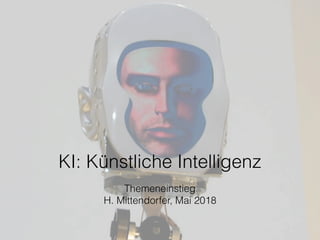
Ki 2
- 1. KI: Künstliche Intelligenz Themeneinstieg H. Mittendorfer, Mai 2018
- 2. Apple’s Vision von 1987 Onlinequelle: https://www.youtube.com/watch?v=QRH8eimU_20
- 3. Die Turing Maschine „Der britische Logiker, Mathematiker und Kryptoanalytiker Alan Turing beschäftigte sich mit den Fragestellungen und der Problematik der KI. Er warf als erster die Frage nach dem Denkvermögen von Maschinen auf und ging dabei von der Idee einer Definition von Berechenbarkeit mit Hilfe der Beschreibung des mathematischen Modellen eines mechanischen (digitalen, Anm. des Verf.) Gerätes aus. Dieses Modell wird gemeinhin als „Turing Maschine“ bezeichnet.“ Quelle: Lohre C. 2007, Können Maschinen denken? Der Turing Test und die Turing Maschine.
- 4. Der Turing-Test The new form of the problem can be described in terms of a game which we call the 'imitation game." It is played with three people, a man (A), a woman (B), and an interrogator (C) who may be of either sex. The interrogator stays in a room apart from the other two. The object of the game for the interrogator is to determine which of the other two is the man and which is the woman. He knows them by labels X and Y, and at the end of the game he says either "X is A and Y is B" or "X is B and Y is A." We now ask the question, "What will happen when a machine takes the part of A in this game?" Will the interrogator decide wrongly as often when the game is played like this as he does when the game is played between a man and a woman? These questions replace our original, "Can machines think?" Quelle: Turing A. 1950, Computing Machinery and Intelligence, Mind, 59, 433-460 Online: http://www.loebner.net/Prizef/TuringArticle.html
- 5. 1966: Eliza von Joe Weizenbaum Onlinequelle: https://www.youtube.com/watch?v=mOO97kgVwrM
- 6. IBM’s Durchbruch 1996 Onlinequelle: https://www.youtube.com/watch?v=NJarxpYyoFI
- 7. Jetzt?
- 8. Chatbotjahr 2017 „In the case of chatbots, every major company has publicly shown willingness to support the technology, and some companies have even revamped their websites to include chatbots in the content.“ Onlinequelle: https://chatbotsmagazine.com/3-reasons-2017-is-the-year-of-the-chatbot-6fa0c783a444
- 9. Virtual personal Assistant „Artificial intelligence is getting a foothold in people’s homes, with VPAs controlling connected devices. How will VPAs change the way we interact with traditional apps?“ Onlinequelle: http://www.gartner.com/smarterwithgartner/control-the-connected-home-with- virtual-personal-assistants/?cm_mmc=Eloqua-_-Email-_-LM_EVT_NA_2017_SWG_NL10_Reach- _-0000&utm_campaign=EVT_NA_2017_SWG_NL10_Reach&utm_medium=email&utm_source=El oqua
- 10. Schlauer Kühlschrank „Laut koreanischen Medienberichten will Samsung seinen hauseigenen digitalen Assistenten «Bixby» in den Kühlschrank «Family Hub 2.0» einbauen. Die Nutzer können dann zum Beispiel neue Kochrezepte, Nachrichten oder auch den Wetterbericht per Sprachassistenten abfragen.“ Onlinequelle: https://www.nzz.ch/digital/vernetzte-kueche-samsung-packt-sprachassistent- bixby-in-den-kuehlschrank-ld.1293682?mktcid=nled&mktcval=101_2017-5-16
- 11. UND…